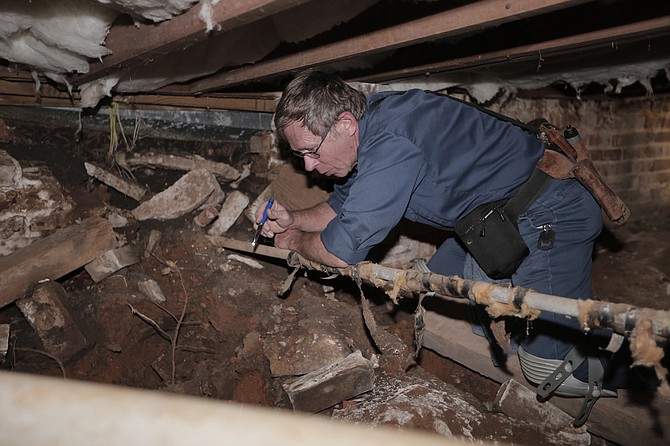Rick Eades climbs under the foundation of city reporter Tim Summers Jr.’s rental home to check the conditions of the pipes. Photo by Imani Khayyam.
JACKSON — Deep, red Yazoo clay, the smell of dogs and damp stick to my clothes, as the spry 70-year-old inspector ahead of me gets down on his hands and knees to crawl under my house. The heavy tool belt around his waist jingles in the dark under the house. He pulls out a tiny magnet on the end of a telescoping rod.
The magnet snaps to the pipe that hangs below the house with a sharp clang. Rick Eades, president of the Mississippi Association of Home Inspectors, smiles and nods, snapping the magnet again and again against the pipe. Each time it hits with a sharp twang.
"These are old galvanized lines," Eades said, pointing to the pipe.
"This is what they were talking about pH and sloughing off old lead."
After several failed attempts to find a homeowner willing to let a photographer and reporter to follow him through an inspection, Eades generously agreed to do one on my old rental home in Belhaven Heights for this story. At the moment, the three of us are all as far underneath the foundation as we can possibly squeeze.
The pipe Eades found runs from the water meter at the street to the inside of my house and is the type of pipe that can leach lead into my drinking water.
It is the kind of pipe that could be in older homes all over Jackson. Inside the house, Eades checks the pipes under the sinks and notes that they are all plastic and new.
Outside the house, Eades takes samples of paint chips from the wall and from the ground below the wall, including a pile of discarded scraps from a recent paint job, presumably before I moved in. He tells me that he has to send the samples off to get tested.
A few days later, I receive an email with the results, which indicate that the paint on the outside of my house, perhaps layers down, as well as some of the paint on the inside of my house, have elevated levels of lead.
What Do I Do Now?
As far as the galvanized pipes, the Mississippi State Department of Health and the EPA suggest installing a filter on the tap in my kitchen in addition to using only cold water to cook with. Every morning flushing the tap before making coffee is a necessity.
There do not seem to be any regulations requiring a homeowner to replace pipes that could contain lead, according to conversations with the EPA, the Mississippi Department of Health and the Mississippi Department of Environmental Quality.
An EPA representative from Washington, D.C., who declined to be identified, stated that the "water system that has installed corrosion control but still fails to meet the action level for lead (15 ppb) in their tap samples must replace 7 percent of their lead lines each year."
Documents from the Mississippi State Department of Health indicate that this process of replacing the service lines comes into effect only after "two consecutive 6-month cycles."
Eades provided a packet of options for water filters with prices that range from the low $100 up to$600.
For renters and homeowners who cannot afford to replace their pipes, these seem to be the only options, and in every direction significant costs follow.
Legal Loophole for Landlords
The lead in the paint raises other questions. Catherine Lee of the Green and Healthy Homes Initiative Jackson advises renters to proceed cautiously.
"In the state of Mississippi there aren't any protections for tenants in the case that they find lead paint in their unit," she said.
"Your landlord at any point can give you 30 days notice and ask you to leave. So you really need to be careful with the way you address it," Lee said. "It's the owner's responsibility to abate the lead, but there are no mandates in the state of Mississippi for landlords to do that."
Lee encourages sharing the results with the landlords, especially in the case of severe chipping paint, inside or out, which she called "unstable paint." This is important outside the house, where the chips can turn into dust that can float into the surrounding neighborhood.
"As a tenant, you need to do some basic kind of precautions," Lee said.
Instead of dry dusting around the house, she suggested using a wet wipe to catch all the harmful lead particles. Instead of using a vacuum cleaner, one should use a mechanical vacuum to prevent unnecessary stirring of any dust within the home.
Dennis Kelly, a lead-paint expert at the Mississippi Department of Environmental Quality, MDEQ, suggested using a Swiffer duster and any method to not kick up any more dust than necessary.
If the property owner does decide to move forward with more permanent forms of abatement, such as stripping and repainting the home, there are regulations requiring that certified contractors perform the work. They are trained, Eades said, to use equipment that will suck up all the dust released during renovation, protecting the surrounding community from unnecessary and potentially hazardous contamination.
Email city reporter Tim Summers Jr. at tim@jacksonfreepress.com.
More like this story
More stories by this author
- DA Smith Wins on One Count, But Passes on 'Whistleblower' Bad Check Claims
- Mayor Yarber, Socrates Garrett Address Contracting Dispute, 'Steering'
- UPDATED: Jury Finds Allen Guilty for Cell-phone Payment, Not Guilty on Nine Counts
- Allen Trial: Defense Rests After Making Case DJP Doesn’t Collect 'Taxes’
- DJP Board Attorney Gibbs Takes Stand to Defend Ben Allen's Actions



Comments
Use the comment form below to begin a discussion about this content.